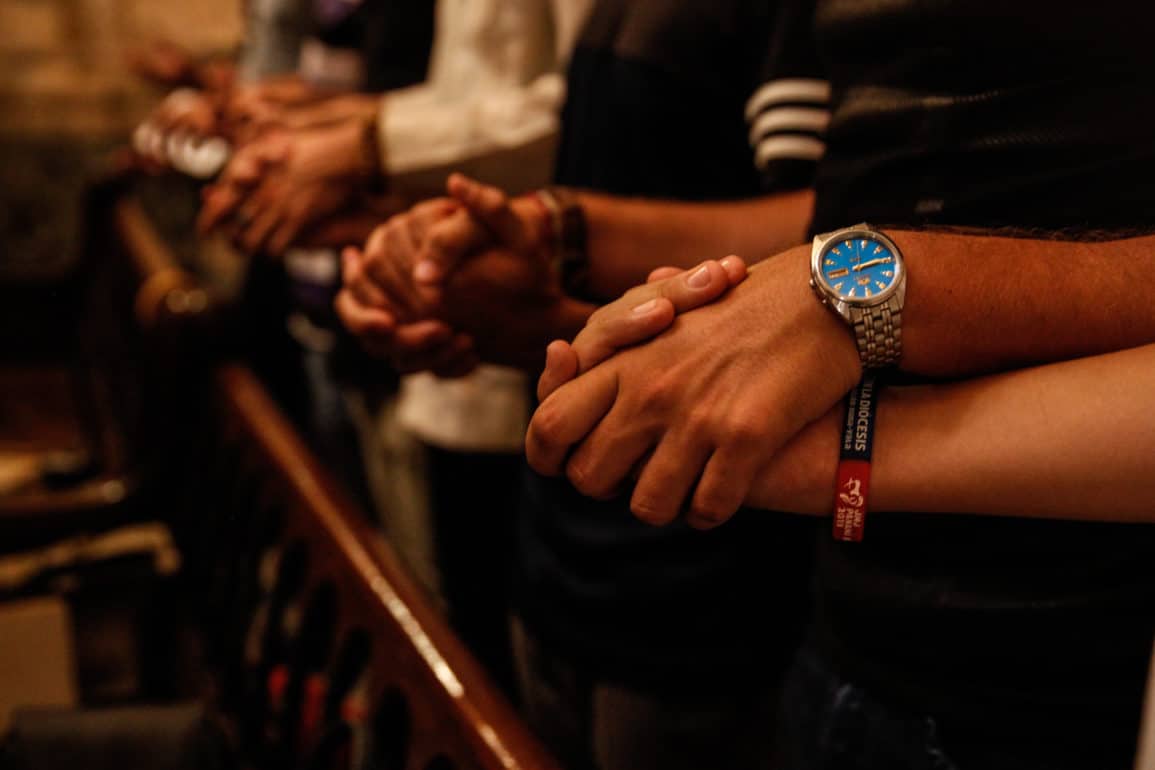Father Jairo Yate, priest and Examining Judge in the diocese of Ibagué, Colombia, explains the Church as a community of communities.
* * *
What Lifestyle does the Church propose?
The 5th Episcopal Conference, held in Aparecida, Brazil in 2007, proposes a Catholic Church that is a community of communities. This will become a reality in the communion of the missionary disciples in the Church. We are Church, we are community, we are missionary disciples, called to live in communion with the Successors of the Apostles and with the Pope.
Why do we have to live in communion with others?
The reason is found in the origin of the Church. The Son of God established a Church of brothers, of Apostles, of men that live in communion, that learn fraternity and Christian values, to be future messengers of the Saviour of the world. The Aparecida Document says:
- At the beginning of His ministry, Jesus chose Twelve to live in communion with Him (cf. Mark 3:14). To foster communion and evaluate the mission, Jesus says to them: “Come away by yourselves to a lonely place, and rest a while” (Mark 6:31-32).
He met with them on other occasions to explain to them the mystery of the Kingdom (cf. Mark 4:11. 33-34). He behaves likewise with the group of seventy-two disciples (cf. Luke 10:17-20).
It seems that, in meeting alone, Jesus wants to speak to their heart (cf. Hosea 2:14). Today also, the disciples meeting with Jesus in intimacy is indispensable to nourish community life and missionary activity.
Disciples Live in Communion
Jesus’ disciples are called to live in communion with the Father (1 John 1:3) and with His Son, Dead and Risen, in “communion in the Holy Spirit” (2 Corinthians 13:13).
The mystery of the Trinity is the source, model, and goal of the mystery of the Church: “a people gathered by the unity of the Father, of the Son and of the Holy Spirit,” called in Christ “as a Sacrament, sign or instrument of the intimate union with God and the unity of the whole human race.”
The communion of the faithful and of the local Churches in the People of God is sustained in communion with the Trinity.
Is there Discipleship without Communion?
- The vocation to missionary discipleship is convocation to communion in His Church. Without communion, there is no discipleship. In face of the temptation, very present in today’s culture, to be Christians without the Church and the new spiritual and individualist searches, we affirm that faith in Jesus Christ came to us through the ecclesial community, which “gives us a family, the universal family of God in the Catholic Church.
Faith frees us from the isolation of the ‘I’ because it leads us to communion.”
What Are the Signs of a Church as a Community of Communities?
In the Acts of the Apostles, the Holy Bible enables us to know exactly what the community was — Church, that Jesus Christ founded for the salvation of the world.
A Church that lives in community, all are brothers, all practice charity and mercy (cf. Acts 2:42-47). All the believers have one heart and one soul (cf. Acts 4:32-37). By their testimony of life and charity, the disciples win esteem for themselves and new apostles are born (cf. Acts 5:12-16).
The faith of the first community of believers was founded on the testimony of concrete men, acquaintances of Christians, and, for the majority, still living among them, the “witnesses of the Resurrection of Christ” (cf. Acts 1:22).
In Christian language, the word “Church” means not only the liturgical assembly (cf. Corinthians 11:18; 14:19.28.34.35) but also the local community (cf. 1 Corinthians 1:2; 16:1) or the whole universal community of believers (cf. 1 Corinthians 15:9; Galatians 1:13; Philippians 3:6; Catechism of the Catholic Church, 752).
The Lord Jesus equipped His community with a structure that will remain until the full realization of the Kingdom. First of all, is the election of the Twelve with Peter as their Head (cf. Mark 3:14-15).
The community of the faithful on earth under the guidance of the common Head, the Pope, and the Bishops in communion with him. They are the Church (Pius XII, Address on February 20, 1946).
How is the living of the Church as a community made a reality?
By the personal and community living of the Beatitudes, the evangelization of the poor; knowledge and fulfillment of the Will of God; martyrdom for the faith; access to all the goods of creation; mutual, sincere, and fraternal forgiveness; accepting and respecting the richness of plurality, and the struggle not to succumb to temptation and not be slaves of evil (Aparecida Document, 383).
How does Pope Francis explain the Church as a community?
He explains it according to the passage of the Book of the Acts of the Apostles (4:32). The Church is the community of the new Christians; a new-born people, a Church where no one suffers need. That is a community.
“The way of living of a Christian community,” of those that believe in Jesus; it is necessary to create an atmosphere in which “peace and harmony reign. ‘It had one heart and one soul . . . ‘ Peace, a community in peace; this means that in that community there was no room for murmurs, envies, calumnies, defamations,” but only for peace, because “forgiveness <and> love, covered all.”
To rate a community Christian in this way, “we must ask ourselves: what is the attitude of Christians? Are they meek and humble? Are their fights in that community between them for power, conflicts because of envy? Do they criticize? Then they don’t go on the path of Jesus Christ” (Homily, Pope Francis, April 29, 2014).
Translation by Virginia M. Forrester










